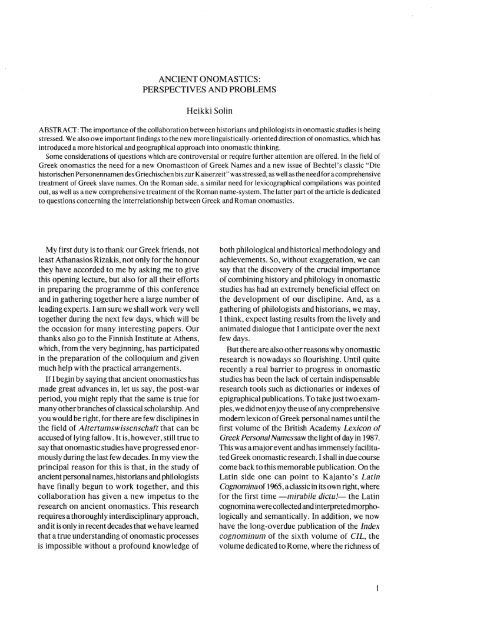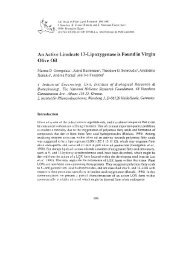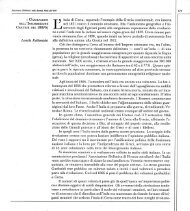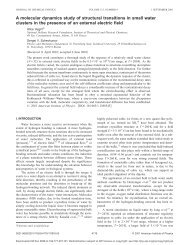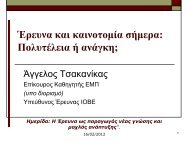Roman onomastics in the Greek East: social and political aspects ...
Roman onomastics in the Greek East: social and political aspects ...
Roman onomastics in the Greek East: social and political aspects ...
Create successful ePaper yourself
Turn your PDF publications into a flip-book with our unique Google optimized e-Paper software.
ANCIENT ONOMASTICS:<br />
PERSPECTIVES AND PROBLEMS<br />
Heikki Sol<strong>in</strong><br />
ABSTRACT: The importance of <strong>the</strong> collaboration between historians <strong>and</strong> philologists <strong>in</strong> onomastic studies is be<strong>in</strong>g<br />
stressed. We also owe important f<strong>in</strong>d<strong>in</strong>gs to <strong>the</strong> new more l<strong>in</strong>guistically-oriented direction of <strong>onomastics</strong>, which has<br />
<strong>in</strong>troduced a more historical <strong>and</strong> geographical approach <strong>in</strong>to onomastic th<strong>in</strong>k<strong>in</strong>g.<br />
Some considerations of questions which are controversial or require fur<strong>the</strong>r attention are offered. In <strong>the</strong> field of<br />
<strong>Greek</strong> <strong>onomastics</strong> <strong>the</strong> need for a new Onomasticon of <strong>Greek</strong> Names <strong>and</strong> a new issue of Bechtel's classic "Die<br />
historischen Personennamen des Griechischen bis zur Kaiserzeit" was stressed, as well as <strong>the</strong> need for a comprehensive<br />
treatment of <strong>Greek</strong> slave names. On <strong>the</strong> <strong>Roman</strong> side, a similar need for lexicographical compilations was po<strong>in</strong>ted<br />
out, as well as a new comprehensive treatment of <strong>the</strong> <strong>Roman</strong> name-system. The latter part of <strong>the</strong> article is dedicated<br />
to questions concern<strong>in</strong>g <strong>the</strong> <strong>in</strong>terrelationship between <strong>Greek</strong> <strong>and</strong> <strong>Roman</strong> <strong>onomastics</strong>.<br />
My first duty is to thank our <strong>Greek</strong> friends, not<br />
least Athanasios Rizakis, not only for <strong>the</strong> honour<br />
<strong>the</strong>y have accorded to me by ask<strong>in</strong>g me to give<br />
this open<strong>in</strong>g lecture, but also for all <strong>the</strong>ir efforts<br />
<strong>in</strong> prepar<strong>in</strong>g <strong>the</strong> programme of this conference<br />
<strong>and</strong> <strong>in</strong> ga<strong>the</strong>r<strong>in</strong>g toge<strong>the</strong>r here a large number of<br />
lead<strong>in</strong>g experts. I am sure we shall work very well<br />
toge<strong>the</strong>r dur<strong>in</strong>g <strong>the</strong> next few days, which will be<br />
<strong>the</strong> occasion for many <strong>in</strong>terest<strong>in</strong>g papers. Our<br />
thanks also go to <strong>the</strong> F<strong>in</strong>nish Institute at A<strong>the</strong>ns,<br />
which, from <strong>the</strong> very beg<strong>in</strong>n<strong>in</strong>g, has participated<br />
<strong>in</strong> <strong>the</strong> preparation of <strong>the</strong> colloquium <strong>and</strong> given<br />
much help with <strong>the</strong> practical arrangements.<br />
If I beg<strong>in</strong> by say<strong>in</strong>g that ancient <strong>onomastics</strong> has<br />
made great advances <strong>in</strong>, let us say, <strong>the</strong> post-war<br />
period, you might reply that <strong>the</strong> same is true for<br />
many o<strong>the</strong>r branches of classical scholarship. And<br />
you would be right, for <strong>the</strong>re are few disclip<strong>in</strong>es <strong>in</strong><br />
<strong>the</strong> field of Altertumswissenschaft that can be<br />
accused of ly<strong>in</strong>g fallow. It is, however, still true to<br />
say that onomastic studies have progressed enormously<br />
dur<strong>in</strong>g <strong>the</strong> last few decades. In my view <strong>the</strong><br />
pr<strong>in</strong>cipal reason for this is that, <strong>in</strong> <strong>the</strong> study of<br />
ancient personal names, historians <strong>and</strong> philologists<br />
have f<strong>in</strong>ally begun to work toge<strong>the</strong>r, <strong>and</strong> this<br />
collaboration has given a new impetus to <strong>the</strong><br />
research on ancient <strong>onomastics</strong>. This research<br />
requires a thoroughly <strong>in</strong>terdiscipl<strong>in</strong>ary approach,<br />
<strong>and</strong> it is only <strong>in</strong> recent decades that we have learned<br />
that a true underst<strong>and</strong><strong>in</strong>g of onomastic processes<br />
is impossible without a profound knowledge of<br />
both philological <strong>and</strong> historical methodology <strong>and</strong><br />
achievements. So, without exaggeration, we can<br />
say that <strong>the</strong> discovery of <strong>the</strong> crucial importance<br />
of comb<strong>in</strong><strong>in</strong>g history <strong>and</strong> philology <strong>in</strong> onomastic<br />
studies has had an extremely beneficial effect on<br />
<strong>the</strong> development of our disclip<strong>in</strong>e. And, as a<br />
ga<strong>the</strong>r<strong>in</strong>g of philologists <strong>and</strong> historians, we may,<br />
I th<strong>in</strong>k, expect last<strong>in</strong>g results from <strong>the</strong> lively <strong>and</strong><br />
animated dialogue that I anticipate over <strong>the</strong> next<br />
few days.<br />
But <strong>the</strong>re are also o<strong>the</strong>r reasons why onomastic<br />
research is nowadays so flourish<strong>in</strong>g. Until quite<br />
recently a real barrier to progress <strong>in</strong> onomastic<br />
studies has been <strong>the</strong> lack of certa<strong>in</strong> <strong>in</strong>dispensable<br />
research tools such as dictionaries or <strong>in</strong>dexes of<br />
epigraphical publications. To take just two examples,<br />
we did not enjoy <strong>the</strong> use of any comprehensive<br />
modern lexicon of <strong>Greek</strong> personal names until <strong>the</strong><br />
first volume of <strong>the</strong> British Academy Lexicon of<br />
<strong>Greek</strong> Personal Names saw <strong>the</strong> light of day <strong>in</strong> 1987.<br />
This was a major event <strong>and</strong> has immensely facilitated<br />
<strong>Greek</strong> onomastic research. I shall <strong>in</strong> due course<br />
come back to this memorable publication. On <strong>the</strong><br />
Lat<strong>in</strong> side one can po<strong>in</strong>t to Kajanto's Lat<strong>in</strong><br />
Cognom<strong>in</strong>a of 1965, a classic <strong>in</strong> its own right, where<br />
for <strong>the</strong> first time —mirabile dictu!— <strong>the</strong> Lat<strong>in</strong><br />
cognom<strong>in</strong>a were collected <strong>and</strong> <strong>in</strong>terpreted morphologically<br />
<strong>and</strong> semantically. In addition, we now<br />
have <strong>the</strong> long-overdue publication of <strong>the</strong> Index<br />
cognom<strong>in</strong>um of <strong>the</strong> sixth volume of CIL, <strong>the</strong><br />
volume dedicated to Rome, where <strong>the</strong> richness of<br />
1


